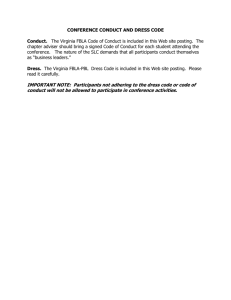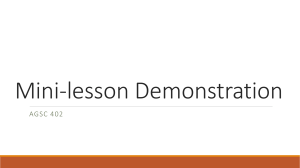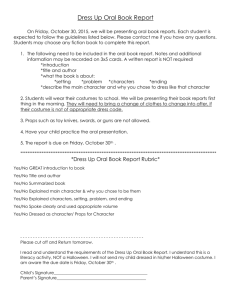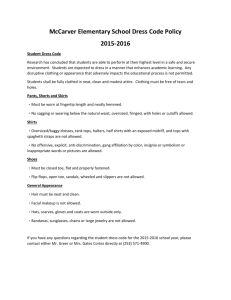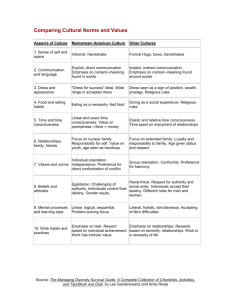Religious belief
advertisement
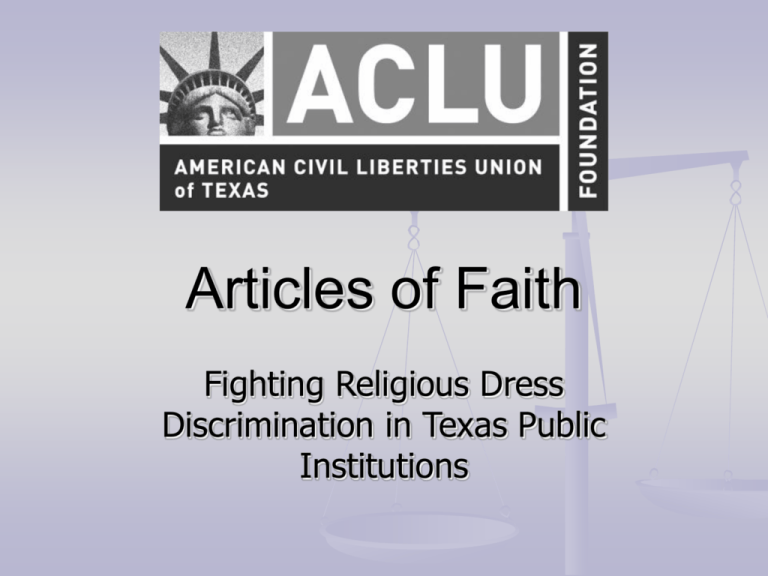
Articles of Faith Fighting Religious Dress Discrimination in Texas Public Institutions ACLU of Texas and the AMSA Community Defend and preserve rights guaranteed in U.S. Constitution, federal and state law Courts, legislature, and communities Receive civil rights complaints from AMSA community related to Racial Justice and Individual Liberties Dress restrictions implicate rights to free exercise of religion and free expression Government Rationales for Restricting Dress Security Safety Student dress codes Justifications include: “to teach hygiene, instill discipline, prevent disruption, avoid safety hazards, and assert authority.” -Needville ISD Dress Code Must be balanced against individuals’ rights Texas Education Code § 11.162 authorizes local school boards to require student uniforms, but parents can request an exemption if they have “a bona fide religious or philosophical objection to the requirement.” Legal Protections for Religious Dress: First Amendment Free Exercise Congress shall make no law respecting an establishment of religion or prohibiting the free exercise thereof. -U.S. Constitution, amt. 1 Triggered when government substantially burdens an individual’s sincerely held religious belief Religious belief: Need not be “acceptable, logical, consistent, or comprehensible to others,” Thomas v. Review Bd. of Indiana Employment Sec. Div., 450 U.S. 707, 714-15 (1981). Sincerely held: Based on “subjective good faith of an adherent,” but countered by inconsistent practice or indication that adherent is “fraudulently hiding secular interests behind a veil of religious doctrine.” Int’l Soc. For Krishna Consciousness, Inc. v. Barber, 650 F.2d 430, 441 (2d Cir.1981). Substantial burden: “[T]ruly pressures the adherent to significantly modify his religious behavior and significantly violate his religious belief.” Adkins v. Kaspar, 393 F.3d 559, 570 (5th Cir. 2004). Legal Protections for Religious Dress: First Amendment Free Exercise Strict scrutiny: Incidental burden on free exercise permitted only when it is the least restrictive means to achieve a compelling government interest. See Sherbert v. Verner, 374 U.S. 398 (1963). Rational basis: In 1990, the Supreme Court abandoned strict scrutiny for neutral laws of general applicability. See Employment Div. v. Smith, 494 U.S. 872 (1990). Hybrid rights: Smith noted heightened scrutiny previously applied only when free exercise was raised with another fundamental right. Some courts read this to require “something more than a mere reasonable relation to some purpose within the competency of the State” when free exercise is raised together with free expression or other fundamental rights. See Alabama & Coushatta Tribes v. Trustees of Big Sandy Indep. Sch. Dist., 817 F.Supp. 1319, 1332 (E.D. Tex. 1993). Legal Protections for Religious Dress: Religious Freedom Restoration Acts Federal RFRA enacted in 1993 to reinstate strict scrutiny in response to Smith Held unconstitutional as applied to states in City of Boerne v. Flores, 521 U.S. 507 (1997) Texas enacted its own RFRA in 1999 State agencies may not “substantially burden a person’s free exercise of religion,” except where the state’s action “(1) is in furtherance of a compelling governmental interest; and (2) is the least restrictive means of furthering that interest.” Free exercise is any “act or refusal to act that is substantially motivated by sincere religious belief,” which need not be “motivated by a central part or central requirement of the person's sincere religious belief.” Requires 60 days notice and opportunity for state agency to remedy by “reasonably remove[ing] the substantial burden,” though remedy need not be the least restrictive means. Legal Protections for Religious Dress: First Amendment Free Expression Congress shall make no law…abridging the freedom of speech. -U.S. Constitution, amt. 1 Triggered when student intends to convey a particularized message, and that “message is likely to be understood by those intended to view it.” Canady v. Bossier Parish Sch. Bd., 240 F.3d 437, 440-41 (5th Cir. 2001). Courts differ on level of scrutiny for student religious dress: Pure speech: Restrictions permitted only if the expression “materially and substantially interfere[s] with the requirements of appropriate discipline in the operation of the school,” Tinker v. Des Moines Indep. Sch. Dist., 393 U.S. 503, 508 (1969). Speech-as-conduct: Restriction permitted if it furthers an important or substantial governmental interest that is unrelated to the suppression of free expression; and the incidental restriction on First Amendment freedoms is no greater than is essential to the furtherance of that interest. United States v. O’Brien, 391 U.S. 367, 377 (1968). Protecting the Right to Religious Dress Singh v. Cercone Amardeep Singh appeared before Dallas County JP Albert Cercone on June 23, 2006 for a traffic violation. Told to remove his “hat” under the court’s “no hats” policy, and threatened with arrest SALDEF put him in touch with ACLU and cooperating attorney Jerry Murad, who filed suit in state court for violation of Texas RFRA. Dallas County and Judge Cercone adopted new security screening policy to be more respectful of religious dress. I could not believe that here in the United States, a judge whose job it is to uphold the law would show such disrespect for my religion. Protecting the Right to Religious Dress A.A. et al. v. Needville ISD Needville ISD put off requests for dress code exemption for a 5-year-old Native American boy with long hair If you want to think we’re backwards…no one is asking you to move to Needville and have these opinions invoked on you. -NISD Superintendent, in Houston Press (7/10/08) In August 2008, NISD adopted an “exemption” requiring the boy to keep his foot-long hair in a “tightly-woven” braid stuffed down the back of his shirt at all times The family refused to choose between their beliefs and their son’s right to an education, so NISD punished the boy with In-School Suspension Protecting the Right to Religious Dress A.A. et al. v. Needville ISD Filed suit October 2, 2008 asserting violations of boy’s rights under First Amendment and Texas RFRA, and parents’ Fourteenth Amendment rights to direct his upbringing “[W]hen the interests of parenthood are combined with a free exercise claim … more than merely a reasonable relation to some purpose within the competency of the State is required … under the First Amendment.” Wisconsin v. Yoder, 406 U.S. 205, 233 (1972). TRO granted October 3 and boy has been in class with no problems ever since On January 20, 2009, U.S. District Judge Keith Ellison ruled in our favor on all claims against the hair requirement NISD has filed an appeal to the Fifth Circuit Court of Appeals Take Action Know your rights Educate others about your rights and beliefs Seek legal assistance Private counsel ACLU online complaint: www.aclutx.org

